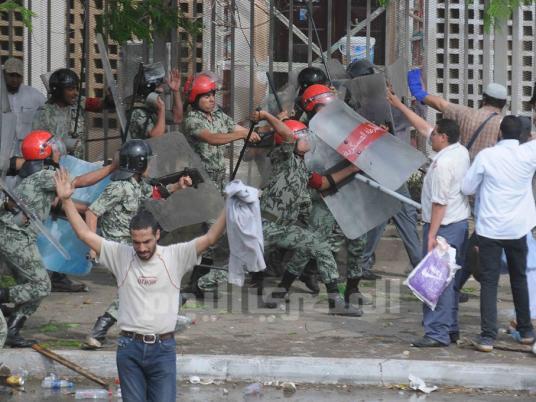
Cases of torture in police stations continue in Egypt despite an uprising that ostensibly began against police brutality, Amnesty International revealed. The recent case of death by torture inside a police station occurred in the area of Meit Ghamr on 16 September.
Amnesty International released two reports Tuesday on Egypt, focusing on the many clashes that occurred during the military-led transition period. One focuses on abuse and violations committed by the military which included killing with impunity in the Maspero protests of October 2011, the Cabinet clashes the following December and the crackdown on the Abbaseya protests last May.
The other report looks at rights-violations by the police and highlights the dire need for reform, it focuses on the first Mohamed Mahmoud clashes in November 2011, the second wave of clashes after the Port Said Stadium disaster in February 2012 and the Nile City tower clashes last August.
And even though the Muslim Brotherhood's Mohamed Morsy has now assumed power, cases of police torture are still endemic with no signs of abating. One recent case took place in the area of Meit Ghamr, in a small village called Wesh El-Balad on 16 September, according to Amnesty.
A woman who owned a local café was beaten by police in front of her children. A man called Atef El-Mansy accompanied the woman to the police station to file a report. At the station he was taken alongside another man Rami Mohamed Rami and they were beaten and tortured for hours. El-Mansy died on the way to hospital as a result of the wounds he sustained.
Clashes ensued in front of the police station as a result of El-Mansy's death, which led to another man being shot dead. Amnesty stated that police responses to gatherings and protest is not commensurate to the situation and is often excessive and results in death.
“Since the [Meit Ghamr] incident, two other people have been killed as a result of police torture, a pattern is emerging of continued police brutality,” said Karim Medhat Ennarah, a researcher at the Egpytian Initiative for Personal Rights.
Amnesty researcher Said Haddadi said, “The police are the biggest instruments of oppression of citizens in Egypt, and there have been no serious steps for reform after the revolution. If there isn't reform in the future then this torture will continue.”
The second report about police abuses indicates the“total impunity” enjoyed by the three main branches of police forces, the Central Security Forces, the General Investigations Police and the once disbanded State Security Investigations, now known as the National Security Investigations.
The report indicated that there was a “longstanding pattern of torture of detainees” by police coupled with a “brazen disregard of the rule of law”.
Deputy Director of Amnesty’s MENA program Hassiba Sahraoui said in a statement, “The police needs root and branch reform to eradicate entrenched abusive behavior.”
The report highlights that the police have responded to peaceful protests with excessive and lethal force, inordinate use of tear gas, beatings and arbitrary arrest. They have also used shotgun pellets, rubber bullets and live ammunition on protesters.
Tear gas and shotgun ammunition has been supplied to Egypt by companies based in the United States before and after the uprising, which has prompted Amnesty to call for a halt of weapons shipments until there are guarantees that they were not be used to carry out human rights abuses, including the use of excessive force against demontrators.
The other report on the military paints a similar picture, with Amnesty documenting unlawful killings and massive ill treatment of protesters by the military, which included beatings, electric shocks and sexual abuse. Victims were not granted redress when there persecutors were tried by military courts, while civilian courts were “unable or unwilling” to indict any military personnel. Thousands were subjected to military trials that the group described as “unfair”.
To add to all this, large swathes of the Egyptian media then “distorted the image of the victims” to allow the military to escape any accountability said Amnesty’s Egypt researcher Mohamed Lotfy.




